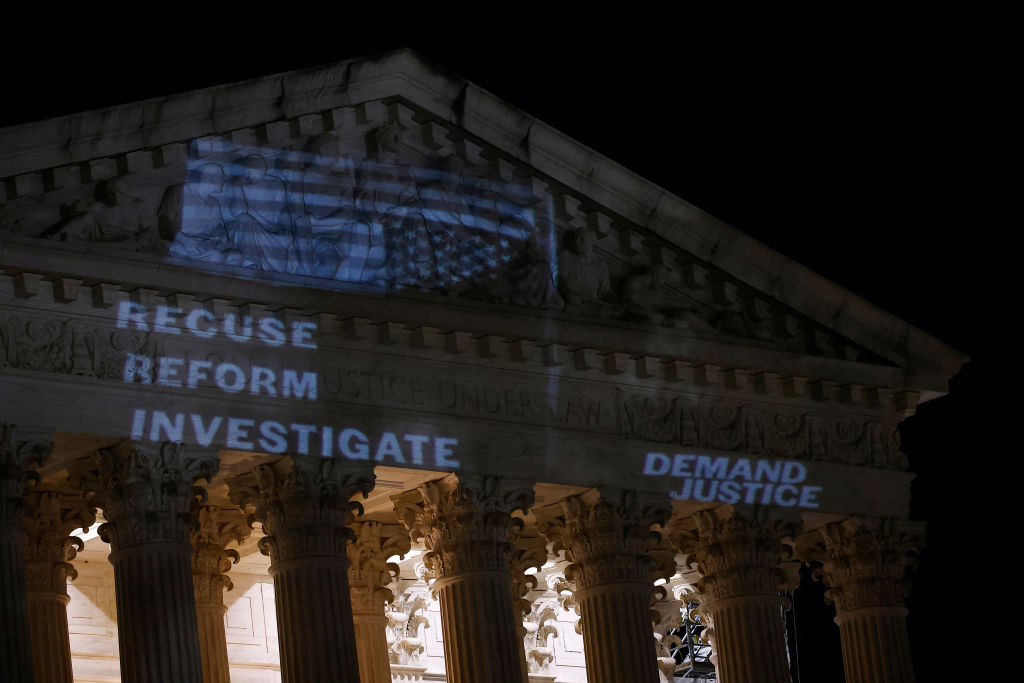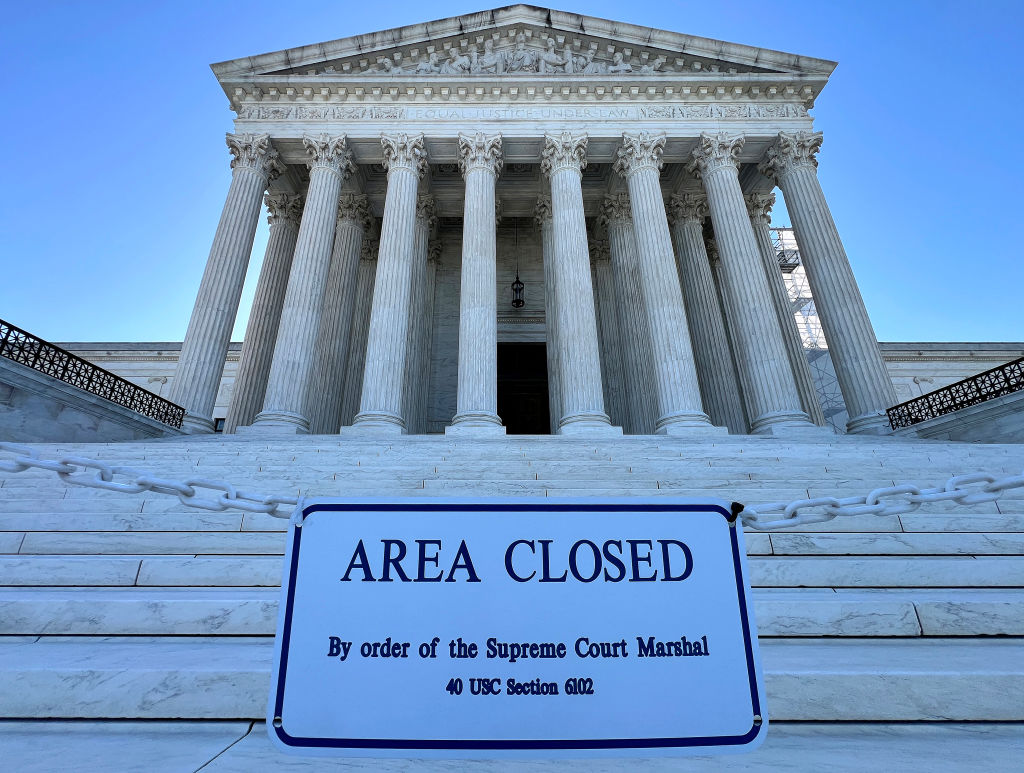SCOTUS Girl Summer
It’s going to be a big month of Supreme decisions. Here’s what to expect.
BY JULIANNE ESCOBEDO SHEPHERD
As Earth barrels into what looks to be another record-setting hot summer, certain U.S. Supreme Court Justices will be presumably enjoying the July-October recess at their beach houses, on luxury yachts, in a pile of dollar bills, and the like. But before the court breaks in about a month, it will be handing down decisions on abortion access, gun laws, social media, and more. So what we’re saying is, bust out the fans, sunscreen, and comfortable marching shoes, because it might be another scorching SCOTUS girl summer in these streets.
Let’s take a look at a few of the most important rulings that will come down from SCOTUS—and one that already has.
THE RACIAL GERRYMANDERING CASE
Remember this when Republicans post MLK Jr. quotes on social media.
Here’s a decision we don’t have to guess about: The court has already handed down one discriminatory, landscape-altering decision in the form of Alexander v. South Carolina NAACP, or the racial gerrymandering case, in which SCOTUS approved a South Carolina voting map that shut out a large portion of the Black population from its district—basically stripping away Black South Carolinians’ voting power. (For a great history of gerrymandering, a wonky word that obscures how much real damage it does to everything from abortion rights to racial justice—The Meteor’s SOL has a terrific explainer for you.)
The decision makes it much easier for any state to redraw voting maps based on racial lines. Not only do these maps benefit white voters above everyone else (and Republicans, since Black voters are more likely to vote Democrat), they are part of a larger effort by extremists to undo voting rights gains made during the Civil Rights Movement. That effort includes big, sweeping devastations, like the gutting of the Voting Rights Act in 2013, and smaller, state-level tremors, such as the Kansas Supreme Court’s anti-American ruling last week that voting isn’t a fundamental right. This SCOTUS ruling didn’t get the press attention it deserved, but it’s a big, big deal.

THE TWO ABORTION CASES
As if Dobbs wasn’t enough!
Coming down shortly from SCOTUS: decisions in two cases that have to do with how—and whether—Americans should be allowed to access the basic medical procedure that is abortion. The first, FDA v. Alliance for Hippocratic Medicine, was brought by a group of anti-abortion doctors who charge that mifepristone, a progesterone blocker used in medication abortion, shouldn’t be accessible by mail. (Here I must stop to observe the irony of a group of people who want to prevent patients from receiving care calling their practice “Hippocratic.” Also, Hippocrates doled out abortion recipes! But I digress.) The FDA approved mifepristone for abortion purposes in the year 2000 after rigorous testing; the Alliance is using junk science to falsely assert, decades later, that the drug puts patients at risk. Were SCOTUS to side with the Alliance, it would hamper abortion care for millions of women across the U.S.—medication is the most common method of abortion—not to mention kneecap the FDA’s ability to approve any drug in the future. Fortunately, this case is expected to go in the favor of the FDA; during oral arguments, a majority of the justices seemed to think the Alliance didn’t have the grounds.
In Idaho v. U.S., the potato state wants to be allowed to imprison doctors and other medical professionals who perform abortions, including in life-threatening cases, unless the pregnant person is literally on their deathbed. That extremist position is in violation of the Emergency Medical Treatment and Labor Act (EMTALA), which requires Medicare-funded hospitals to administer treatment to anyone who requires emergency care. (Forgot what EMTALA is, exactly? We’ve got another explainer.) The U.S. sued Idaho shortly before its law took effect, and now here we are, begging nine unelected officials to let people live their lives. (Or, as the ACLU put it, “Supreme Court to decide whether politicians can deny emergency care to pregnant people.”) The conservative justices were hard to read during oral arguments, but The Nation’s Elie Mystal thinks it’s not looking good for U.S. (and us).
THE DOMESTIC ABUSERS WITH GUNS CASE
Seems like they shouldn’t have them? But I’m just one lady with a brain.
In 2019, a 23-year-old Texas man named Zackey Rahimi was seen dragging the mother of his child across a parking lot, banging her head on the dash as he threw her into his car. When he realized there was a witness, Rahimi fired a gun at that person—resulting in a civil protective order that barred him from owning a gun and a restraining order to protect his former partner. Then after he was arrested for violating the restraining order, using a gun to threaten yet another woman, and shooting a gun five separate times in unrelated incidents, the state banned him from having guns under a statute that says, logically, that domestic abuse suspects should not have guns.
But after SCOTUS overturned a New York gun law that required a license to carry a concealed weapon, Rahimi sued and claimed that the domestic abuse law preventing him from having a gun is unconstitutional. (*silent scream*) And now gun stans are hoping that the court will loosen the country’s extremely loose gun requirements even further. “If we’re just going to go back to the time in which the Second Amendment was written, that’s terrifying,” Krista del Gallo, legislative director for the Texas Council on Family Violence, told the Texas Tribune. “It’s also—I’ll use this term—offensive. It’s offensive to women and children, who were the property of their husbands at the time; it’s offensive to Black people, [who] were not fully citizens at the time. There’s just so much there.”
THE UNHOUSED-PEOPLE CAMPING CASE
Is public land too public?
Another case coming down the pike goes after some of the most vulnerable among us: Grants Pass v. Johnson is a case in which the small city of Grants Pass, Oregon, wants to continue to arrest and fine unhoused people for sleeping outside. (Maybe this country should invest in housing for all?) The Ninth Circuit affirmed that doing so constituted “cruel and unusual punishment” in violation of the Eighth Amendment’s imprisonment regulations, but the city continues to argue otherwise. Now we’re about to see yet another test of this court’s capacity for compassion with a ruling that will affect the unhoused in every state in America.

OH—DID YOU THINK WE FORGOT ABOUT JANUARY 6?
In addition to the aforementioned nail-biters, there are also a few cases that go to the heart of what our democracy even is—and what it might become. They raise questions like:
- Can a former president be prosecuted for, say, trying to overturn the results of a democratic election? Or can he be charged for obstructing the certification of those results? We’ll discover those answers in the cases of Trump v. United States and Fischer v. U.S.
- Can a presidential administration ask social media companies to stop spreading misinformation about, say, unprecedented health crises? You’d think this is a gimme, but the Republican Attorneys General who filed Murthy v. Missouri say no!
- SCOTUS will also need to answer the existential question of whether or not the federal government should do, like, anything? Some people (Relentless, Inc. v. Dept. of Commerce, Loper Bright Enterprises v. Raimondo) are wondering.
If all of this happens to rile you up, there are steps you can take that don’t involve magically animorphing into President Biden and pushing Congress to expand the courts. (But wouldn’t it be nice?)
- Demand Justice, which recently projected an upside-down flag on the Supreme Court building in a sly protest of Alito’s (wife’s) (allegedly) own upside-down flag, has a number of ways to get involved with their movement, including donating and joining their rapid response team.
- If you happen to be an attorney or law student—or even if you don’t—you can join the Peoples’ Parity Project, which has many chapters at colleges and in cities across the country. (You can also donate or pick up some pretty cool merch.)
- Fix the Court could use your donation, too, for their big ideas and a roster of several, small but mighty ways SCOTUS could become, in Peoples’ Parity Project’s words, “unfucked.”
See you out there. 🌞

Julianne Escobedo Shepherd is a writer, culture critic, and editor in NYC. Her first book, Vaquera, about growing up in Wyoming and the myth of the American West, is forthcoming for Penguin.